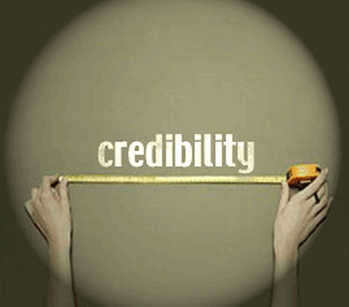 Written by Melissa Anzman
As a solopreneur, I have been constantly told that one of the most important pillars of success is building credibility within your market or niche. Experts say that if you can show you are credible, then people will want to “buy-in” to what you are saying and selling.
Written by Melissa Anzman
As a solopreneur, I have been constantly told that one of the most important pillars of success is building credibility within your market or niche. Experts say that if you can show you are credible, then people will want to “buy-in” to what you are saying and selling.
But credibility plays an important role in a corporate environment as well – and it’s a component of success that is often overlooked as we climb the ladder.
Your credibility “record” at work starts with your first job application and follows you throughout your career. I remember earlier in my career, being worried that my failures would follow me like a report card to my next job… like your high school grades can haunt you through college. I thought there was an employee record that went with you. It makes me laugh now. And while a folder doesn’t follow you per say, your credibility does.
7 Ways You are Ruining Your Credibility
1. Not being responsive.
With as many emails as we get these days, it’s necessary to prioritize and respond accordingly. There are some emails that simply don’t need a response (think: thank you! emails), but pretty much everything else, particularly from your boss, needs some sort of acknowledgement.
It’s up to you to decide what your typical turnaround time is to set the precedent, but your credibility builds faster when you respond quicker. If you are able to answer email requests quickly and efficiently and reliably, then people will start to see you as an expert in certain areas. Just be sure that when you do respond, it’s well thought-out, concise, and relevant.
2. Not being a “details” person.
There are definitely jobs that lend itself to more or less detailed tasks on a daily basis, but in every position, being detail-oriented is always part of the job description. Not being meticulous with details because someone else holds the ultimate responsibility or will come behind you and double check, can discredit your reputation extremely fast.
If you touch it, you need to review it – with a fine tooth comb. It has your name on it and therefore, your credibility is at stake.
For many of us, this takes a lot of practice and diligence. But like any habit, the more you practice it, the better you will become at it. Review your emails for content and conciseness, flow through your projects to ensure details are reflected accurately, and examine your work before submitting it to the next level.
3. Passing the buck.
“That’s not my job” is probably one of the most common phrases I utter in everyday work. However, it’s very rare that I will say that out loud because I learned early on that not only do people look at you as though you’re elitist when you say that, but it also decreases your credibility in being able to deliver and be a team player.
Even if the task you are asked to do isn’t on your official job description, it can still benefit your overall success. Suck it up, do the job, and use it as an opportunity to show your willingness to help out. If you have to whine about it, do it to your friends.
4. Fumbling little details in important events/meetings.
There is nothing worse than having technical difficulties during a conference call or event. Nothing. I know, we’re human, technology is annoying, and so on – but if you are organizing a meeting/event, then the technological aspects of it should run smoothly for participants.
When you can’t dial into the line, the video doesn’t show up properly, there isn’t an agenda, or you start late and repeat everything that the late arrivals missed… you are an amateur. Plain and simple, it will reflect poorly on your overall credibility, even if “technology” is not included in your job description.
Things happen, I get that – but if it’s preventable, do everything in your power to make the details unnoticeable.
5. Your dress/attire and overall put-togetherness.
It pains me to say this as I’m really a jeans and a tee-shirt person, through and through, but how you present yourself to your work audience plays a huge role in overall credibility. The old saying, “Dress for the job you want, not the job you have,” carries weight.
Pull yourself together and make sure that you present a tidy/neat/awesome visual appearance, even if it means you explore expressing your individuality only outside of work. We are visual people – so your appearance makes a huge first impression and can damage your reputation without even trying. Pull it together nicely and present the best side of your style, forward. See also: no shorts, tank tops, flip flops, and so on.
6. Responding with incorrect information.
You know that person in the office – the one who has a response for everything, but they are so quick to reply that they often get it wrong? Don’t be that guy.
Having to clarify the responses of others, or clean up their mistakes, is never fun. Even worse is the damage done to your reputation and credibility if “everything” you say has to be researched and verified. To avoid this, simply do the necessary research before responding to inquiries and requests. Let your words, estimations, and research speak for themselves – don’t allow the doubt to creep in, and you will not be second guessed.
7. Your office hours and availability.
I full-heartedly believe in a flexible work environment, hours, and office structure. But if you are partaking in said freedoms/perks, it’s imperative that you are consistent with your availability and true to your agreement.
For example, if you work from home during the hours of 9am – 4pm, then you should be somewhat available and responsive during those times. If you take a call “from home,” there shouldn’t be excessive (ahem – Starbucks) background noise or screaming kids or barking dogs. It’s still work – so be sure that you are just as vigilant to those expectations as your colleagues are, or your credibility of actually “working from home” will be shattered.
Overall, your credibility is built over time – but can be damaged in an instant. The best way to safeguard it, is to be the best version of yourself that you can be, at work – and deliver, or exceed on agreed upon expectations. This is one area where merit, effort, and output well outweigh “personality.”
I'd love to hear from you in the comments below: How have you restored your credibility when you've fumbled in the past?
About Melissa
Melissa Anzman is the creator of Launch Your Job where she equips ambitious leaders with practical ways to grow their career. She is the author of two books: How to Land a Job and Stop Hating Your Job. Follow her @MelissaAnzman.
